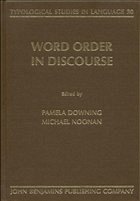Main description:
This volume brings together a collection of 18 papers dealing with the problem of word order variation in discourse. Word order variation has often been treated as an essentially unpredictable phenomenon, a matter of selecting randomly one of the set of possible orders generated by the grammar. However, as the papers in this collection show, word order variation is not random, but rather governed by principles which can be subjected to scientific investigation and are common to all languages.
The papers in this volume discuss word order variation in a diverse collection of languages and from a number of perspectives, including experimental and quantitative text based studies. A number of papers address the problem of deciding which order is 'basic' among the alternatives. The volume will be of interest to typologists, to other linguists interested in problems of word order variation, and to those interested in discourse syntax.
Table of contents:
- List of abbreviations
- Word order in discourse
- What are discourse principles made of?
- Agent position in the Sejarah Melayu
- Preverbal nominals in Colville-Okanagan
- Frequency and pragmatically unmarked word order
- Subject-verb word order and the function of early position
- Focus position in SOV languages
- Word order at the noun phrase level in Japanese
- WH-clefs and left-dislocation in English conversation
- Pragmatic relations and word order in Chinese
- Left shifts in strongly VSO languages
- The pragmatics of verb initial sentences in some ancient Indo-European languages
- Morphological and prosodic forces shaping word order
- The word order of two-constituent constructions in spoken Spanish
- Verb initial languages and information order
- On the discourse function of possessor movement in Emai prose narratives
- Focal attention, voice, and word order
- Noun incorporation and object placement in discourse
- Subject Index
- Author Index
This volume brings together a collection of 18 papers dealing with the problem of word order variation in discourse. Word order variation has often been treated as an essentially unpredictable phenomenon, a matter of selecting randomly one of the set of possible orders generated by the grammar. However, as the papers in this collection show, word order variation is not random, but rather governed by principles which can be subjected to scientific investigation and are common to all languages.
The papers in this volume discuss word order variation in a diverse collection of languages and from a number of perspectives, including experimental and quantitative text based studies. A number of papers address the problem of deciding which order is 'basic' among the alternatives. The volume will be of interest to typologists, to other linguists interested in problems of word order variation, and to those interested in discourse syntax.
Table of contents:
- List of abbreviations
- Word order in discourse
- What are discourse principles made of?
- Agent position in the Sejarah Melayu
- Preverbal nominals in Colville-Okanagan
- Frequency and pragmatically unmarked word order
- Subject-verb word order and the function of early position
- Focus position in SOV languages
- Word order at the noun phrase level in Japanese
- WH-clefs and left-dislocation in English conversation
- Pragmatic relations and word order in Chinese
- Left shifts in strongly VSO languages
- The pragmatics of verb initial sentences in some ancient Indo-European languages
- Morphological and prosodic forces shaping word order
- The word order of two-constituent constructions in spoken Spanish
- Verb initial languages and information order
- On the discourse function of possessor movement in Emai prose narratives
- Focal attention, voice, and word order
- Noun incorporation and object placement in discourse
- Subject Index
- Author Index

